DOWNLOAD NEWS 2014/15
by Brian Wilson, Jonathan Rohr and Geoffrey Molyneux
Reviews are by Brian Wilson except where otherwise stated.
This will be the last Download News in the current format. In future
I shall be submitting the majority of my reviews, whether from download,
CD, SACD, DVD or blu-ray, for the main MusicWeb International pages.
DL News will become a shorter affair with links to downloads of music
reviewed by my colleagues and myself. There will also be occasional
short articles on material available only for download, such as Beulah
releases, or on offer at a bargain price.
2014/15 Index:
AHO Concertos for Horn and Theremin_BIS
Symphony No.11; Symphonic Dances_BIS
ALBENIZ Iberia ; FALLA_Music of Spain Volume 3_Beulah
BACH Orchestral Suites_Academy of Ancient Music_Harmonia Mundi_BIS
Magnificat ; HANDEL Utrecht Te Deum and Jubilate_Beulah
BAX Tintagel, etc._Lyrita
Symphonies 2 and 5_Lyrita
BEAMISH The Seafarer Trio + DEBUSSY
La Mer _Orchid
BENNETT W.S. Symphony in g minor, Op.43, etc._Lyrita
BLISS Music for Strings, Meditation on a Theme by John Blow,
etc._Lyrita
British Piano Concertos _Lyrita
British String Concertos _Lyrita
BRITTEN A Boy was born + HOWELLS, LEIGHTON, etc._Signum
BRUCKNER Symphony No. 9_LSO Live
Christmas
Bis willekommen _Ensemble Nobiles_Genuin
Christmas Carols from 17th century Hungarian Transylvania
_Hungaroton
Incarnation – see BRITTEN
Sing Thee Nowell New York Polyphony_BIS
COATES The Three Men Suite, etc._Lyrita
Summer Days, From Meadow to Mayfair, The Three Elizabeths, Dambusters,
etc._Lyrita
Courts of Heaven : Music from the Eton Choirbook, Vol.
3_Avie
DEBUSSY La Mer – see BEAMISH
ELGAR Enigma Variations; Falstaff_Beulah
FALLA – see ALBENIZ
FOULDS Hellas , Three Mantras, etc._Lyrita
HANDEL Fireworks Suite – see MENDELSSOHN
Music for Queen Caroline_Les Arts Florissants_Hyperion
Utrecht Te Deum and Jubilate – see BACH
HARTY John Field Suite, etc_Chandos
HODDINOTT Four Welsh Dances, etc. + JONES, MATHIAS_Lyrita
HURLSTONE Piano Concerto, Piano Trio and Piano Quartet_Lyrita
IRELAND Legend, Satyricon Overture, Piano Concerto, These
Things Shall Be, etc._Lyrita
JONES Dance Fantasy_Lyrita – see HODDINOTT
MATHIAS Celtic Dances_Lyrita – see HODDINOTT
MELANI Marienvesper _CPO
MENDELSSOHN Symphony No.3_Hebrides; MOZART Eine kleine
Nachtmusik; HANDEL Fireworks Suite_Beulah
MESSIAEN La Nativité _Winpenny_Naxos
MOZART Eine kleine Nachtmusik – see MENDELSSOHN
RAUTAVAARA Angel of Light; Cantus Arcticus_BIS
SCHUBERT Die Winterreise _Harmonia Mundi
SCHUMANN Noveletten; Nachtstücke _Hyperion
SCOTT Piano Concertos Nos. 1 and 2_Lyrita
SIBELIUS Tone Poems_BIS
Something’s Gotta Give _Chandos
My Recordings of the Year
Byrd’s Masses and Tallis’s Missa puer natus est (both Hyperion)
yield to an Obsidian recording with the intriguing title The Spy’s
Notebook. Spying for Henry VIII on a rival claimant to the throne
didn’t prevent Pierre de la Rue from gathering a first-class collection
of early Renaissance music, excellently presented by Alamire and David
Skinner. (OBSID-CD712, 2014/13).
Of many splendid reissues I select a Zig-Zag Territoires budget set
of music by Corelli and Vivaldi, half of it of very recent provenance
(Gli Incogniti, ZZT349, 2014/13),
even above much appreciated re-releases of the music of John Tavener
by The Sixteen (Coro) and The Tallis Scholars (Gimell).
Two bargains stand out: a 50-CD set of Baroque music (Decca) and, just
beating it to the post, all Richard Strauss’s operas in mostly authoritative
performances on a 33-CD set from DG (4792274 – article),
divided into two for download purposes (2014/11).
2013 ended with a splendid Bach Christmas Oratorio (Hyperion)
but the recent Mass in b minor (Hyperion CDA68051/2, 2014/14)
just edges it out, if only because it’s performed by a very promising
and versatile young group, Arcangelo, who have also recorded Monteverdi
for Hyperion.
Among Beethoven recordings Piano Concertos Nos. 3 and 4 from Pires and
Harding (Onyx 4125, 2014/13)
just beat the Piano Trios Nos. 6 and 7 (Harmonia Mundi). I’m not alone
in the hope that this will be the start of a complete series.
Last choice goes to The fire that breaks from thee (EMRCD023,
2014/12)
primarily for bringing to light a wonderful violin concerto by Robin
Milford which should never have been hidden.
You’ll find the choices of the other MusicWeb International reviewers
here.
Lyrita from Classicsonline and Naxos Music Library
I’m delighted to see that we now have a new download source for Lyrita
recordings from classicsonline.com (COL), at the full bit-rate of 320kb/s
and with the booklets in pdf format. They are also available for streaming
from Naxos Music Library, again with the booklets. Now all we need
is for them to be offered in lossless form.
I’ve picked out almost at random from the complete offering a few that
I haven’t covered and some that I have reviewed in inferior downloads.
Click on the catalogue number for the link to COL:

 •Arnold
BAX – Northern Ballad No.1, Mediterranean, The Garden of Fand, Tintagel,
November Woods: SRCD.231
–review
– review.
Even if you have the very fine Naxos recording of Symphony No.2 and
November Woods, this Lyrita recording is almost mandatory.
•Arnold
BAX – Northern Ballad No.1, Mediterranean, The Garden of Fand, Tintagel,
November Woods: SRCD.231
–review
– review.
Even if you have the very fine Naxos recording of Symphony No.2 and
November Woods, this Lyrita recording is almost mandatory.
• Arnold BAX – Symphonies Nos. 2 and 5: SRCD.233.
Recording of the Month – review.
Another well-nigh mandatory recording for Baxians.

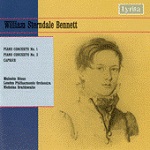 •
William Sterndale BENNETT – Symphony in g minor, Op.43, etc.: SRCD.206
–review,review
and DL
Roundup June 2009. Once again the COL download comes in better
sound than the emusic.com which I reviewed before.
•
William Sterndale BENNETT – Symphony in g minor, Op.43, etc.: SRCD.206
–review,review
and DL
Roundup June 2009. Once again the COL download comes in better
sound than the emusic.com which I reviewed before.
• William Sterndale BENNETT – Piano Concertos Nos. 1 and
3: SRCD.204
– review.
COL also have Piano Concertos Nos. 2 and 5:SRCD.205
– review.
Both come in better transfers than those from emusic.com which I reviewed
in August
2009 and the pdf booklets with valuable notes are part of the deal
– I specifically mentioned their absence from the emusic.com versions.
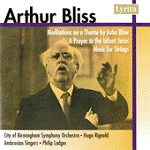 •
Sir Arthur BLISS – Music for Strings, Meditation on a Theme by John
Blow, A Prayer to the Infant Jesus:
SRCD.254 –review
and review.
The performances by the City of Birmingham Symphony Orchestra/Hugo Rignold
and the Ambrosian Singers/Philip Ledger are about as good as it gets
and this remains the only recording of the Prayer to the Infant Jesus
in the UK catalogue.
•
Sir Arthur BLISS – Music for Strings, Meditation on a Theme by John
Blow, A Prayer to the Infant Jesus:
SRCD.254 –review
and review.
The performances by the City of Birmingham Symphony Orchestra/Hugo Rignold
and the Ambrosian Singers/Philip Ledger are about as good as it gets
and this remains the only recording of the Prayer to the Infant Jesus
in the UK catalogue.
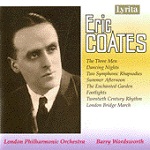
 •
Eric COATES – The Three Men Suite, etc. SRCD.213
–
review and review
•
Eric COATES – The Three Men Suite, etc. SRCD.213
–
review and review
• Eric COATES – Summer Days, From Meadow to Mayfair, The
Three Elizabeths, Dambusters March, etc.:
SRCD.246 – review.
Coates was the all-time great purveyor of light-classical music. These
two very fine albums – the second is especially valuable, though I wish
it might have been an all-Coates programme – need to be supplemented,
for example by the 2-CD Classics for Pleasure set of his music where
you’ll find the essential Coates works London Suite and London
Again (3523562, Sir Charles Groves, Sir Charles Mackerras
and Reginald Kilbey). There’s also a surprisingly idiomatic Marco Polo
recording with the Slovak Radio Orchestra containing the two London
Suites (8.223445 – download only: available in mp3 and lossless
from eclassical.com.
See December
2010 DL Roundup.
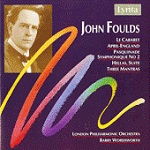 •
John FOULDS – Hellas, Three Mantras, etc. SRCD.212
– review
and review.
Dutton have recently been doing very well by Foulds, especially his
lighter music (review),
but Lyrita were ahead of them with this valuable recording of his more
serious music, first released in 1993. This is still the only recording
of these works, apart from Three Mantras and April-England
on a Warner Apex budget reissue of music by Foulds (2564645113).
•
John FOULDS – Hellas, Three Mantras, etc. SRCD.212
– review
and review.
Dutton have recently been doing very well by Foulds, especially his
lighter music (review),
but Lyrita were ahead of them with this valuable recording of his more
serious music, first released in 1993. This is still the only recording
of these works, apart from Three Mantras and April-England
on a Warner Apex budget reissue of music by Foulds (2564645113).
 •
William HURLSTONE – Piano Concerto, Piano Trio and Piano Quartet:
SRCD.2286
(2 CDs) – review.
I recommended this 2-CD set last year when reviewing a new recording
of the Piano Trio on the Divine Art label – DL
News 2013/17. The classicsonline.com download is in better quality
than that from emusic.com.
•
William HURLSTONE – Piano Concerto, Piano Trio and Piano Quartet:
SRCD.2286
(2 CDs) – review.
I recommended this 2-CD set last year when reviewing a new recording
of the Piano Trio on the Divine Art label – DL
News 2013/17. The classicsonline.com download is in better quality
than that from emusic.com.
• John IRELAND – Legend, Satyricon Overture, Piano
Concerto, These Things Shall Be, etc.:
SRCD.241 – review.
This is the single most important recording of Ireland’s music and though
I have greatly enjoyed hearing or re-hearing all these albums, it’s
my pick of these downloads if only because I haven’t been listening
to Ireland nearly enough recently. Eric Parkin in the Piano Concerto
and Legend is rivalled only by Piers Lane whose recording is
available in lossless sound as well as mp3 (Hyperion CDA67296,
with Delius Piano Concerto – review
–review
– Hyperion
Top 30).
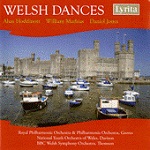 •
Alun HODDINOTT Four Welsh Dances, Overture Jack Straw, Concerto
Grosso, Op.46/2; Investiture Dances, Op. Op.66, Welsh Dances Set 2,
Op.64; William MATHIAS Celtic Dances, Op.60; Daniel JONES
Dance Fantasy:
SRCD.334 –
•
Alun HODDINOTT Four Welsh Dances, Overture Jack Straw, Concerto
Grosso, Op.46/2; Investiture Dances, Op. Op.66, Welsh Dances Set 2,
Op.64; William MATHIAS Celtic Dances, Op.60; Daniel JONES
Dance Fantasy:
SRCD.334 –  review.
The Royal Philharmonic Orchestra/Sir Charles Groves, The National Youth
Orchestra of Wales/Arthur Davison and the BBC Welsh Symphony Orchestra/Bryden
Thomson contribute to this enjoyable set of recordings collectively
entitled Welsh Dances.
review.
The Royal Philharmonic Orchestra/Sir Charles Groves, The National Youth
Orchestra of Wales/Arthur Davison and the BBC Welsh Symphony Orchestra/Bryden
Thomson contribute to this enjoyable set of recordings collectively
entitled Welsh Dances.
• Cyril SCOTT – Piano Concertos Nos. 1 and 2 from John Ogdon,
the LPO and Bernard Herrmann:SRCD.251
–review
and July
2009 DL Roundup. The COL download comes in better sound than that
from emusic.com which I reviewed; it’s worth paying a little extra for.
This performance of the filler, Early One Morning, is also available
at budget price on British Piano Concertos (see below).
Beulah Releases
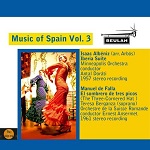 3PD88:
Music of Spain Volume 3 contains two works: Isaac ALBÉNIZ
Iberia Suite in the orchestral arrangement of Enrique Fernández
Arbós (Minneapolis Orchestra/Antal Doráti, rec. 1957, stereo) and Manuel
de FALLA El sombrero de tres picos (Three-cornered hat) in
the classic recording by Teresa Berganza (soprano), the Orchestre de
la Suisse Romande and Ernest Ansermet (1961, stereo). It’s due soon
from Amazon UK and iTunes.
3PD88:
Music of Spain Volume 3 contains two works: Isaac ALBÉNIZ
Iberia Suite in the orchestral arrangement of Enrique Fernández
Arbós (Minneapolis Orchestra/Antal Doráti, rec. 1957, stereo) and Manuel
de FALLA El sombrero de tres picos (Three-cornered hat) in
the classic recording by Teresa Berganza (soprano), the Orchestre de
la Suisse Romande and Ernest Ansermet (1961, stereo). It’s due soon
from Amazon UK and iTunes.
On Mercury 4343892 which, in any case, is now available in the UK only
as part of a 6-CD download, the Albéniz was somewhat incongruously coupled
with Mussorgsky; here the Falla coupling for Doráti’s high-energy performance
is much more logical. The recording is good if a trifle brash – reflecting,
I believe, the original.
If you have the very fine Montréal/Dutoit version of the Falla on Decca’s
budget twofer (4661282) the Ansermet is well worth having as
an adjunct, especially as the recording has come up very well in this
transfer. It’s also available on two differently coupled mid-price
Decca recordings but the alternative release on a budget Double Decca
set (4339082) is no longer available in the UK even as a download.
The only surprise is that Ansermet’s recording of Iberia (released
like the Doráti in 1960, on SXL2243) was not chosen as the Beulah coupling.
The Eloquence reissue employs Ansermet’s earlier (1952, mono) recording
with Suzanne Danco – review
– which is also available inexpensively on Naxos Classical Archives
for £1.99 in the UK – DL
Roundup September 2011/2 – but not in the USA and many other countries.
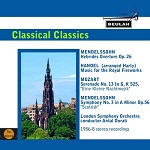 1PDR2:
Classical Classics [79:57] consists of a series of performances
recorded by Mercury with the London Symphony Orchestra and Antal Doráti
in early stereo (1956-8). MENDELSSOHN’s Hebrides Overture
is followed by the Hamilton Harty suite from HANDEL’s Fireworks
Music, MOZART’s Serenade No.13, K525 (Eine kleine Nachtmusik)
and the programme is rounded off with a performance of Mendelssohn’s
Symphony No.3 (‘Scottish’). Download from Amazon
UK, Amazon US or iTunes.
1PDR2:
Classical Classics [79:57] consists of a series of performances
recorded by Mercury with the London Symphony Orchestra and Antal Doráti
in early stereo (1956-8). MENDELSSOHN’s Hebrides Overture
is followed by the Hamilton Harty suite from HANDEL’s Fireworks
Music, MOZART’s Serenade No.13, K525 (Eine kleine Nachtmusik)
and the programme is rounded off with a performance of Mendelssohn’s
Symphony No.3 (‘Scottish’). Download from Amazon
UK, Amazon US or iTunes.
The Harty Fireworks Music suite is something of a dinosaur nowadays,
with unbelievably heavy overture and bourrée. Dinosaurs are
fascinating, too – ask any primary-age child – but I’m afraid that I’ve
moved on as far as Handel is concerned and the recording has worn less
well than most Mercuries. Not surprisingly, there’s only one other
recording of the Harty Fireworks, on an LPO historical 4-CD set.
If you want Harty’s Handel I’d recommend a budget-price 1983 recording
of the Water Music from the Ulster Orchestra and Bryden Thomson,
also containing the John Field Suite, Londonderry Air
and In Ireland (Chandos Collect CHAN6583 [50:17] – download
from theclassicalshop.net,
mp3 £4.80, lossless £4.99).
Eine kleine Nachtmusik receives a stylish performance and the
recording, though released at much the same time as the Handel, sounds
a great deal better.
The two Mendelssohn items were first released in the UK on mono MMA11048
and, though the Scottish symphony already had a string of distinguished
competitors, William Mann thought it only a little short of the best.
I enjoyed hearing this performance. My touchstone is always the transition
from the main body of the finale to the coda: the gear change here is
a little abrupt but not unduly so. The recording has held up well in
this transfer –by comparison with recent offerings such as Gardner on
Chandos CHSA5139 – review
– extreme treble and bass are somewhat prominent at the expense of middle
frequencies. In 1959 listeners had to turn over for the finale, the
new transfer makes this unnecessary.
The codec on my review copy of this and some of these other Beulah releases
insisted that I was listening to the Bruch Violin Concerto, but that
probably won’t apply to the commercial version.
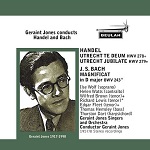 1PDR3:
Geraint Jones conducts HANDEL and BACH.
1PDR3:
Geraint Jones conducts HANDEL and BACH.
The DG Archiv recording of Handel’s Utrecht Te Deum and Jubilate
(1713), released in 1959, is here coupled with Bach’s Magnificat
(HMV, 1957). Geraint Jones, his Singers and Orchestra offer performances
of Handel and Bach much more sympathetic to our period-instrument-attuned
ears than Doráti’s take on Harty’s Handel. The Handel performances
are stylish and vigorous enough almost to persuade me that the music
is better than I recall from other performances – it’s not usually reckoned
among Handel’s finest – and the recording, DG Archiv’s first made in
England, holds up well.
Some very fine performers are listed for the Bach: Ilse Wolf, Helen
Watts, Wilfred Brown, Richard Lewis, Edgar Fleet, Thomas Hemsley and
(Professor) Thurston Dart on harpsichord continuo. This is vintage
Bach but Lionel Salter thought the performance not quite in the same
league as the music. He was mainly worried by the fast tempi but nowadays
we are used to Bach in less stately guise: Jones’ time of 28:53 overall
is actually slightly slower than Richard Hickox’s on Chandos CHAN0518,
a highly regarded version with Vivaldi Gloria, which takes 27:14.
Indeed, most modern recordings come in at under or around 28 minutes,
with some, such as Peter Dijkstra with Concerto Köln (BR Klassik 900504)
and Pierre Pierlot with the Ricercar Consort (Mirare MIR102),
taking only a shade over 26. I’m glad that Beulah have resurrected
this performance – it’s more in accord with modern attitudes to Bach
and I enjoyed it. As with the Handel, the recording has come up sounding
well in this transfer. A small plus: the words magnificat and
magna are pronounced with a hard g, as it would have been
in North Germany in Bach’s time.
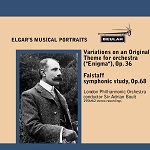 7PD12:
ELGAR’s Musical Portraits . The portraits in question are those
encapsulated in the Enigma Variations, Op.36, and Falstaff,
Op.68, Elgar’s only but very successful foray into the world of the
Straussian symphonic poem. The performances are from the LPO and Sir
Adrian Boult, recorded in stereo in 1961 or 1962 and 1956 respectively.
From Amazon
UK and iTunes.
7PD12:
ELGAR’s Musical Portraits . The portraits in question are those
encapsulated in the Enigma Variations, Op.36, and Falstaff,
Op.68, Elgar’s only but very successful foray into the world of the
Straussian symphonic poem. The performances are from the LPO and Sir
Adrian Boult, recorded in stereo in 1961 or 1962 and 1956 respectively.
From Amazon
UK and iTunes.
The 1956 Falstaff is also available from First Hand Records (FHR06,
3 CDs: Bargain of the Month – review
and DL
Roundup January 2012) but, though there are Boult Enigmas
of earlier and later vintage, I don’t think this 1962 version is available
anywhere. It first appeared on World Record Club and later on Classics
for Pleasure and it has always taken a back seat to Boult’s other performances,
with slow tempi characterised by reviewers as sounding tired. I owned
the WRC LP and liked it, but when I bought the LSO/Monteux recording,
now on Eloquence 4805019, with Dvorák Symphony No.7, or very
inexpensively on its own on Beulah Extra 1BX181:
Recording of the Year 2012, I preferred that and still do. Listening
again to the Boult, however, I’d now characterise it as sensitive rather
than slow.
The Falstaff is excellent and the transfer is very good but there
is one small problem: it’s not a capital offence and Beulah can neither
be blamed for it nor rectify it – the Pye LP used for the transfer was
missing the last very quiet note.
***
Courts of Heaven: Music from the Eton Choirbook,
Vol. 3
John HAMPTON Salve Regina a5 [15:37]
Edmund TURGES Gaude flore virginali a4 [13:43]
John FAWKYNER Gaude virgo salutata a5 [18:49]
John BROWNE O mater venerabilis a5 [14:18]
Robert WYLKYNSON Salve Regina a5 [13:19]
Walter LAMBE Nesciens Mater (bonus track, download only)
[5:26]
The Choir of Christ Church Cathedral, Oxford/Stephen Darlington
rec. Merton College Chapel, Oxford, April 2014. DDD
AVIE AV2314 [81:12] – from
emusic.com (mp3, no booklet) or stream from Naxos
Music Library (without bonus track but with pdf booklet containing
texts and translations).
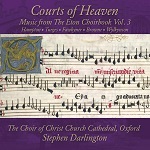 This
series of recordings from the wonderful late 15th-/early
16th-century Eton Choirbook has now reached its third volume,
encouraging the hope that it will eventually be at least as comprehensive
as Coro’s 5-CD series of recordings from the collection by The Sixteen
(COR16050, also available separately) for those who prefer the
music to be sung – and very well sung – by the kind of all-male choir
for whom the music was intended but also for those who, like me, also
enjoy good performances from mixed professional choirs such as The Sixteen
or The Tallis Scholars, who have also recorded some of this repertoire
(John Browne: Music from the Eton Choirbook, Gimell CDGIM036
or better value on a 2-for-1 set, The Tallis Scholars sing Tudor
Music I, CDGIM209).
This
series of recordings from the wonderful late 15th-/early
16th-century Eton Choirbook has now reached its third volume,
encouraging the hope that it will eventually be at least as comprehensive
as Coro’s 5-CD series of recordings from the collection by The Sixteen
(COR16050, also available separately) for those who prefer the
music to be sung – and very well sung – by the kind of all-male choir
for whom the music was intended but also for those who, like me, also
enjoy good performances from mixed professional choirs such as The Sixteen
or The Tallis Scholars, who have also recorded some of this repertoire
(John Browne: Music from the Eton Choirbook, Gimell CDGIM036
or better value on a 2-for-1 set, The Tallis Scholars sing Tudor
Music I, CDGIM209).
With only one other work in common with other recordings, Wylkynson’s
5-part Salve Regina (not to be confused with his longer 9-part
setting of the same text on Volume 2, Avie AV2184) we’re already
into previously unrecorded territory with volume 3.
The emusic.com download is not at the ideal 320kb/s but it sounds more
than adequate and, at around 240kb/s, it’s about as good as you are
likely to get by paying three times the price from Amazon and iTunes.
Classicsonline.com offer 320kb/s, with booklet, but don’t include the
bonus track. 7 digital include the bonus and offer the album in 320kb/s
sound for £5.94 but don’t provide the booklet. Subscribers to Naxos
Music Library can get the booklet there.

 You
should enjoy Christmas Carols from 17th century Hungarian
Transylvania if you know and like similar collections from the nearby
Czech Republic such as Ryba’s Czech Christmas Mass (Supraphon
SU36582 – December
2011/2) – the church letting its hair down in the vernacular language
and musical style. (Hungaroton HCD32019 [71:48])
You
should enjoy Christmas Carols from 17th century Hungarian
Transylvania if you know and like similar collections from the nearby
Czech Republic such as Ryba’s Czech Christmas Mass (Supraphon
SU36582 – December
2011/2) – the church letting its hair down in the vernacular language
and musical style. (Hungaroton HCD32019 [71:48])
The problem is that the download from eclassical.com
(mp3 and lossless) comes devoid of any booklet of notes or text and
Naxos
Music Library, which does have some Hungaroton booklets, has none
to offer in this case. Neither offers anything more than the title
and translation of it. I can’t therefore give a recording date; though
I think it’s not recent – a sticker on the cover says ‘from the archives’
– the recording is decent enough. I’d recommend buying the CD for the
notes, but it’s not available in the UK.
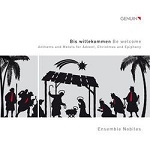

Bis Willekommen (Be welcome) contains music for Advent,
Christmas and Epiphany sung by Ensemble Nobiles on Genuin GEN14314
[62:32] – from eclassical.com
(mp3, 16- and 24-bit lossless, with pdf booklet containing texts).
The composers range from Benedict DUCIS (1492-1544) via Michael
PRÆTORIUS (1571-1621) to Peter Karl Wolfgang BERG (b.1990).
All the composers are German-speaking, with the exception of Conditor
alme siderum by Tomás Luis de VICTORIA (1548-1611). There’s
much here that was new to me but there’s nothing to raise a traditionalist’s
hackles: even the contemporary works are as smooth as the performances,
which some may find a trifle bland. Comparing the performance of the
Victoria with that of Plus Ultra (DG Archiv 4779747) you might
almost be listening to a different work. The recording is beautifully
clear.
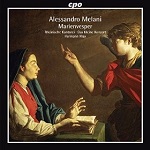 Alessandro
MELANI (1639-1703)
Alessandro
MELANI (1639-1703)
Marienvesper (Vespers of the Virgin Mary) (first modern performance)
[65:53]
Soloists of the Rheinische Kantorei: Veronika Winter (soprano), Maria
Skiba (soprano), Franz Vitzthum (counter-tenor), Elisa Rabanus (soprano),
Matthias Vieweg (baritone), Magdalene Harer (soprano), Immo Schroder
(tenor), Markus Flaig (baritone), Hans Jörg Mammel (tenor)
Das Kleine Konzert/Hermann Max
pdf booklet with texts and translations included
rec. August 2012, Rheingau Musik Festival, Kloster Eberbach, Basilika.
DDD
CPO 7779362 [65:53] – from eclassical.com
(mp3 and lossless) or stream from Naxos Music Library
Don’t be surprised if you haven’t even heard of Melani, let alone these
Vespers settings which are receiving their first complete performance
in modern times. There’s precious little of his music on record but
CPO now have two albums – there’s an earlier release of L’Europa
and sacred works, again from Das Kleine Konzert and Hermann Max on 7774082.
Jonathan Woolf thought the music there anything but competent and
dull – review
– and that may be the place to start because I thought the Vespers music
mostly attractive but hardly special.
The performances are mostly up to the high standards that we have come
to expect from Max and his team, though I thought some of the soprano
singing occasionally slightly less than ideal. In any case, as the
notes point out, the top lines were intended not for female voices but
for boys or castrati. Try this one first if you can, from NML.
Johann Sebastian BACH (1685-1750)
 It
is possible to obtain the Four Overtures or Orchestral Suites
on a single CD, so it may seem extravagant for the new recording from
the Academy of Ancient Music directed by Richard Egarr (harpsichord)
on their in-house label to run to two full-price CDs, with no fillers
but if you obtain the download from eclassical.com, the per-second charging
policy takes care of that, with mp3 and 16-bit at $16.82 and 24-bit
at $25.24. (AAM003 [93:28] – from eclassical.com
(mp3, 16- and 24-bit lossless) or
classicsonline.com (mp3) or stream from Naxos
Music Library, all with pdf booklet).
It
is possible to obtain the Four Overtures or Orchestral Suites
on a single CD, so it may seem extravagant for the new recording from
the Academy of Ancient Music directed by Richard Egarr (harpsichord)
on their in-house label to run to two full-price CDs, with no fillers
but if you obtain the download from eclassical.com, the per-second charging
policy takes care of that, with mp3 and 16-bit at $16.82 and 24-bit
at $25.24. (AAM003 [93:28] – from eclassical.com
(mp3, 16- and 24-bit lossless) or
classicsonline.com (mp3) or stream from Naxos
Music Library, all with pdf booklet).
The performances are given on one instrument per part, tuned to A=392Hz,
but they specifically eschew the now common practice of taking the music
at a fast pace on the reasonable basis that very fast performances belie
the dance nature of the music. Even by comparison with the modern-instrument
performances by the Academy of St Martin in the Fields and Neville Marriner
(Decca 4303782) many of the tempi are fairly sedate. I recommend
trying these new recordings before purchase if possible.
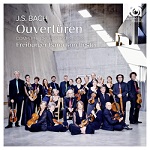 I’m
finding the tempi a little too sedate in the main and, for the moment
at least, I’m staying with that Decca recording or one of the period-instrument
versions, such as the Freiburg Baroque Orchestra on Harmonia
Mundi, also running to two discs, with alternatives for some of the
movements. ( HMC902113/14 [93:25] – from eclassical.com,
mp3, 16- and 24-bit lossless or stream from Naxos
Music Library, both with pdf booklet). Brian Reinhart made this
one of his top choices in 2013/18,
alongside a budget-price 6-disc compendium of Bach’s music from Café
Zimmermann on Alpha ALPHA811 – reviewed April
2012/1 – from classicsonline.com
or stream from Naxos
Music Library. The Suites are from Café Zimmermann are also available
on separate albums but more expensively:
I’m
finding the tempi a little too sedate in the main and, for the moment
at least, I’m staying with that Decca recording or one of the period-instrument
versions, such as the Freiburg Baroque Orchestra on Harmonia
Mundi, also running to two discs, with alternatives for some of the
movements. ( HMC902113/14 [93:25] – from eclassical.com,
mp3, 16- and 24-bit lossless or stream from Naxos
Music Library, both with pdf booklet). Brian Reinhart made this
one of his top choices in 2013/18,
alongside a budget-price 6-disc compendium of Bach’s music from Café
Zimmermann on Alpha ALPHA811 – reviewed April
2012/1 – from classicsonline.com
or stream from Naxos
Music Library. The Suites are from Café Zimmermann are also available
on separate albums but more expensively:
• Suite No.1 on Volume 2: ALPHA048 [58:02] with Brandenburg
Concerto No.3, the 2-Violin Concerto, BWV1043, and the Concerto for
Violin and Oboe, BWV1050 – from eclassical.com
(mp3 and lossless)
• Suite No.2 on Volume 3: ALPHA071 [70:25] with Brandenburg
Concerto No.4, Oboe d’amore concerto, BWV1053 and 3-Keyboard Concerto
BWV1064 – from eclassical.com
(mp3 and lossless)
• Suite No.3 on Volume 5: ALPHA168 [58:23] with Keyboard
Concerto BWV1056, Brandenburg Concerto No.6 and 3-Keyboard Concerto
BWV1063 – fromeclassical.com
(mp3 and lossless). See August
2011/1 DL Roundup
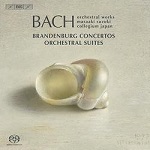 •
Suite No.4 on Volume 6: ALPHA181 [59:08] with Keyboard Concerto
BWV1055, Brandenburg Concerto No.1 and 4-Keyboard Concerto, BWV1065
– from eclassical.com
(mp3 and lossless)
•
Suite No.4 on Volume 6: ALPHA181 [59:08] with Keyboard Concerto
BWV1055, Brandenburg Concerto No.1 and 4-Keyboard Concerto, BWV1065
– from eclassical.com
(mp3 and lossless)
Another very distinguished set on period instruments comes from Masaaki
Suzuki and his Bach Collegium of Japan on BIS (BIS-SACD-1431,
2 CDs [97:56] – download from eclassical.com,
mp3, 16- and 24-bit lossless or, with Brandenburg Concertos, BIS-SACD1211/22
– from eclassical.com,
mp3, 16- and 24-bit lossless). Of these the 3-CD set offers the better
value, with 24-bit currently at the same price as mp3 and 16-bit. The
set of the Suites alone comes as 2-for-1 on CD, around £12. As I write
the download is on offer at a 50% Christmas discount but afterwards
it appears likely to cost more than the CDs – check it against local
prices for the discs.
George Friderick HANDEL (1685-1759) Music for Queen Caroline
The King shall rejoice (Coronation Anthem), HWV260 (1727) [10:43]
Te Deum in D, ‘Queen Caroline’, HWV280 (1714) [15:22]
The ways of Zion do mourn (Funeral Anthem for Queen Caroline),
HWV 264 (1737) [46:03]
Tim Mead (counter-tenor); Sean Clayton (tenor); Lisandro Abadie (baritone)
Les Arts Florissants/William Christie
rec. 20-21 November 2013, Notre Dame du Liban Church, Paris. DDD
Booklet includes texts and a specially commissioned short story.
LES ARTS FLORISSANTS AF004 [72:08] – from eclassical.com
(mp3, 16- and 24-bit lossless)
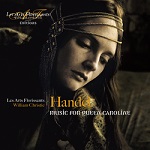
 Te
Deum comparative version: Hyperion CDA66315 – Gillian Fisher
(soprano), James Bowman (counter-tenor), John Mark Ainsley (tenor),
Michael George (bass); Choir of New College Oxford; The King’s Consort/Robert
King (with Ode for the Birthday of Queen Anne and Sing unto
God). Archive service or download from hyperion-records.co.uk
(mp3 and lossless).
Te
Deum comparative version: Hyperion CDA66315 – Gillian Fisher
(soprano), James Bowman (counter-tenor), John Mark Ainsley (tenor),
Michael George (bass); Choir of New College Oxford; The King’s Consort/Robert
King (with Ode for the Birthday of Queen Anne and Sing unto
God). Archive service or download from hyperion-records.co.uk
(mp3 and lossless).
I don’t recall ever having heard the ‘Queen Caroline’ Te Deum –
actually it seems to have been intended for the arrival of her father-in-law,
George I and her husband, the future George II, and to have been repeated
when Caroline joined them in London – but it’s at least the equal of
the better-known Dettingen and Utrecht settings of the canticle. It
beggars belief that the excellent Hyperion recording is Archive Service
or download only – or that I had missed it myself.
The new recording from Les Arts Florissants is also very good indeed,
so the choice of coupling can safely determine your choice. Perhaps
the music goes with slightly more of a swing on the new recording.
The Coronation Anthem which opens the new recording is also well
performed, but you may well have one or more fine recordings of the
complete Anthems – perhaps the King’s/ Willcocks (Double Decca or Eloquence)
to represent the ‘old school’ and The Sixteen/Christophers (Coro) in
more ‘authentic’ guise.
You probably don’t have the music for Queen Caroline’s funeral, The
ways of Zion do mourn, unless you own one of the recordings of Israel
in Egypt in the version of that oratorio to which Handel prefixed
an arrangement of the music as the Israelites mourning the death of
Joseph. (The 6-CD budget set of Handel works on Warner 2564698385
includes John Eliot Gardiner’s performances of both works.) The trick
is to keep the music moving without making it sound either lugubrious
or unfeeling and Christie achieves that very well.
The Hyperion recording opens with the wonderful anthem for Queen Anne’s
Birthday, Eternal source of Light divine, the most substantial
work on that CD. It’s splendidly performed and there’s no music quite
so marvellous on the new album. Otherwise honours are about equal,
with very fine performances of the Te Deum on both.
Both Hyperion and Les Arts Florissants recordings are very good. The
new album has the edge in offering a 24-bit alternative but the Hyperion
costs a mere £5.99. Both come with excellent pdf booklets.

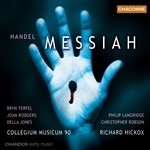
 The
Freebie of the Month for subscribers to theclassicalshop.net
newsletter is a serviceable Naxos recording of choruses from Handel's
Messiah conducted by Jaroslav Kr(e)cek with the Bratislava City
Choir and Capella Istropolitana (8.550317).
The
Freebie of the Month for subscribers to theclassicalshop.net
newsletter is a serviceable Naxos recording of choruses from Handel's
Messiah conducted by Jaroslav Kr(e)cek with the Bratislava City
Choir and Capella Istropolitana (8.550317).
I wouldn’t recommend this set as anything like top choice, however:
if you are in the business of buying I’d go for one of the many complete
recordings from MWI
Recommends, to which I’d add one that I don’t think I’ve mentioned
before, directed by Richard Hickox from theclassicalshop.net’s own parent
label Chandos (CHAN0522 – from theclassicalshop.net,
mp3 and lossless, with pdf booklet). The young Bryn Terfel is among
the fine soloists and Collegium Musicum 90 provide the usual excellent
support.
Franz SCHUBERT (1797-1828) Die Winterreise , D911
 Matthias
Goerne (baritone) ends his distinguished series of nine Schubert
Lieder recordings for Harmonia Mundi, with Christoph Eschenbach (piano),
on HMC902107 [74:38] – from eclassical.com
(mp3, 16- and 24-bit lossless, with pdf booklet including texts and
translations). This by no means the first time that he has tackled
this greatest of all Lieder cycles, with recordings to his credit for
Hyperion (CDA30021, with Graham Johnson – see October
2010) and Decca (4670922, live from the Wigmore Hall, with
Alfred Brendel). I judged that Hyperion recording suitable as a Desert
Island companion, not least for the rapport between Goerne and Johnson,
who hand-picked the singer, but the new recording offers the very strongest
competition and also comes – at a premium – in excellent 24-bit sound.
Matthias
Goerne (baritone) ends his distinguished series of nine Schubert
Lieder recordings for Harmonia Mundi, with Christoph Eschenbach (piano),
on HMC902107 [74:38] – from eclassical.com
(mp3, 16- and 24-bit lossless, with pdf booklet including texts and
translations). This by no means the first time that he has tackled
this greatest of all Lieder cycles, with recordings to his credit for
Hyperion (CDA30021, with Graham Johnson – see October
2010) and Decca (4670922, live from the Wigmore Hall, with
Alfred Brendel). I judged that Hyperion recording suitable as a Desert
Island companion, not least for the rapport between Goerne and Johnson,
who hand-picked the singer, but the new recording offers the very strongest
competition and also comes – at a premium – in excellent 24-bit sound.
The sadly downsized remnant of the Penguin Guide mostly restricts itself
to a single recommendation for each major work – in this case the 3-CD
DG set with Dietrich Fischer-Dieskau and Gerald Moore (see above: Schwanengesang).
That’s an excellent recommendation, but one size doesn’t fit all. Dieskau
and Moore don’t have the sole and final word on Winterreise:
my colleagues have variously recommended
eight different recordings, including three of them by Fischer-Dieskau,
with Gerald Moore (EMI), Alfred Brendel (Philips, now Decca) and Jörg
Demus (DG – see October
2010), to which I’ll add one more, with Daniel Barenboim (DG Virtuoso
4785186, an excellent budget-price account: don’t pay more for
a download than the £6.50 or so which the CD sells for). Of the other
recordings which are listed, only the Ian and Jennifer Partridge (CFP)
seems to me to be a non-runner.
Robert SCHUMANN (1810-1856)
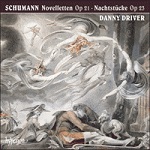 A
new Hyperion release of Schumann’s Noveletten [47:35]
Nachtstücke [19:08] and Romance No.2 [3:51] is very welcome (
CDA67983 [70:34] – from hyperion-records.co.uk,
mp3, 16- and 24-bit lossless, with pdf booklet). Danny Driver
has a real feeling for Schumann’s music and style. His performances
of the eight pieces comprising Novelletten, Op.20 are so well
contrasted, with an infinite variety of touch, expression and mood.
This cycle is surely one of Schumann’s most technically and emotionally
demanding and Danny Driver is well able to deal with the challenges
involved.
A
new Hyperion release of Schumann’s Noveletten [47:35]
Nachtstücke [19:08] and Romance No.2 [3:51] is very welcome (
CDA67983 [70:34] – from hyperion-records.co.uk,
mp3, 16- and 24-bit lossless, with pdf booklet). Danny Driver
has a real feeling for Schumann’s music and style. His performances
of the eight pieces comprising Novelletten, Op.20 are so well
contrasted, with an infinite variety of touch, expression and mood.
This cycle is surely one of Schumann’s most technically and emotionally
demanding and Danny Driver is well able to deal with the challenges
involved.
The first section of Novelletten Op.21/1 is played, as requested
by Schumann, marcato con forza; to Driver this is no dry or rigid-tempo
march, but a strongly rhythmical and exciting tour de force with
expressive possibilities. In spite of considerable and convincing rubato,
the performance retains its march-like qualities and is full of character.
The ensuing Trio is beautifully played with touching melody and superb
tone, thanks to top quality playing and excellent recording from Hyperion.
No.3 is similarly characterful and is suitably light and humorous while
No.6 provides another example of lively, buoyant and agile playing.
The sections of each piece are based around stories or characters and
No.6 is dominated by the character of Florestan, lively and extrovert
as the piece appears to be building to a climax. The music soon dies
away to a gentle conclusion, characterised by Schumann’s alter ego
Eusebius, and all this is admirably portrayed by Driver, who is just
as successful in the longer pieces containing many sections, such as
No.8, the final work in the collection.
What strikes me most about this set is the way Danny Driver constantly
maintains his listeners’ interest and attention with carefully controlled
and infinite variety within the nine pieces. I cannot imagine the Novelletten
better played.
The four pieces of Nachtstücke are very different in mood. They
were originally imagined by the composer as funereal-style pieces but
Clara Wieck suggested that it would better not to include the titles
he had in mind. The first piece is the longest and Driver builds to
a superb climax before the music dies to a gentle ending. These big
contrasts are captured well by the Hyperion recording. The second piece
is quite virtuosic but Driver plays with crystal-clear clarity and he
makes excellent mood contrasts in the ensuing sections. No 3 again gives
Driver ample opportunity to display his infallible technique and I was
really impressed with his interpretation of the melancholic central
section. The balancing was superbly done and the return to faster music
well controlled.
The three Op.28 Romances were written around the same time as
the other works on this recording and Driver concludes his recital with
No.2, the most often played of the set. It is given an attractive and
characterful performance and provides a contrast with the Novelletten
and Nachtstücke, which we regretfully hear performed less frequently.
So full marks for programme building. All in all I wholeheartedly enjoyed
these performances. They are impeccably played and the recording is
well up to Hyperion’s usual superb quality.
Geoffrey Molyneux
Anton BRUCKNER (1824-1896)
Symphony No. 9 in d minor (1887-96, ed. Nowak 1951)
London Symphony Orchestra/Bernard Haitink
rec. live, 17 and 21 February 2013, Barbican, London
Pdf booklet included
LSO LIVE LSO0746 [67:10] – from hyperion-records.co.uk
(mp3, 16- and 24-bit lossless)

Just when I was beginning to get used to the idea of Bruckner’s Ninth
as a four-movement work in the completion recorded by the Berlin Philharmonic
and Simon Rattle, along come two most convincing recordings of the three-movement
work, from Claudio Abbado (DG 4793441) and now from Bernard Haitink.
This recording has been reviewed by Dan Morgan, who rated it as one
of the best, as a 24/96 download – here
– and by John Quinn – here – who thought it gripping and magisterial. I’m not about to disagree,
but I’d urge you not to overlook the Abbado, especially valuable as
it was his last recording: Recording of the Month – review
and DL
News 2014/10.
As Dan Morgan reviewed the 24-bit version – which costs a tad more than
the SACD – I tried the 16-bit lossless version which, at £6.50, costs
less than the disc and still sounds very well.
Bargain of the Month
Jean SIBELIUS (1865-1957) Tone Poems – from eclassical.com
(mp3 and lossless with pdf booklet)

 BIS
will be releasing download volumes from their complete Sibelius recordings
at regular intervals during his 150th anniversary year, 2015,
commencing with a 5-CD set of the Tone Poems for the attractive price
of $29.15. That’s less than $6 per disc or $4.50 per hour and it supersedes
the Amazon download of the symphonies, violin concerto and tone poems,
mostly taken from the BIS series, which I have hitherto recommended
as the best Sibelius bargain: the eclassical.com download comes at the
full mp3 bit-rate, as opposed to Amazon’s 256kb/s or less, or in lossless
sound for the same low price. The CD set will typically cost you around
£40.
BIS
will be releasing download volumes from their complete Sibelius recordings
at regular intervals during his 150th anniversary year, 2015,
commencing with a 5-CD set of the Tone Poems for the attractive price
of $29.15. That’s less than $6 per disc or $4.50 per hour and it supersedes
the Amazon download of the symphonies, violin concerto and tone poems,
mostly taken from the BIS series, which I have hitherto recommended
as the best Sibelius bargain: the eclassical.com download comes at the
full mp3 bit-rate, as opposed to Amazon’s 256kb/s or less, or in lossless
sound for the same low price. The CD set will typically cost you around
£40.
The authoritative accounts are those recorded by the Lahti Symphony
Orchestra and Osmo Vänskä apart from Cassazione, Op.6 and Scènes
Historiques (CD5), which come from the Gothenburg SO and Neeme Järvi.
The album booklet comes as part of the deal – again, Amazon don’t include
a booklet – which includes an account of the transformations undergone
by the Lemminkäinen Suite, of which all versions and variants
(1896, 1897 and 1939) are included here together with the original and
final versions of The Oceanides, Cassazione and In
memoriam.
Olivier MESSIAEN (1908-1992) La Nativité du Seigneur
(1935)

 To
the very fine recordings by Tim Byram-Wingfield (Delphian DCD34078,
2 CDs –
review), Hans-Ola Ericsson (BIS-CD-410: September
2011/1 – download from eclassical.com,
mp3 and lossless), Gillian Weir (Priory – download only, from theclassicalshop.net,
mp3 and lossless) and, perhaps still best of all, Jennifer Bate (Treasure
Island UKCD600, 6 budget-price CDs or Regis RRC1087) we
must now add a new recording by Tom Winpenny on the organ of St. Alban’s
Abbey (Naxos 8.573332). Among the many virtues of the new recording
are its availability in 24/96 sound from eclassical.com
and the inclusion of a full organ specification in the booklet. That
24-bit version comes at a premium over the CD, at $16.51, but the other
plus – apart from the quality of Winpenny’s performance and the recording
– is that the CD can be yours at budget price and the mp3 download from
classicsonline.com
costs only £4.99. Stream all the versions of La Nativité that
I have mentioned from Naxos
Music Library for your own comparison.
To
the very fine recordings by Tim Byram-Wingfield (Delphian DCD34078,
2 CDs –
review), Hans-Ola Ericsson (BIS-CD-410: September
2011/1 – download from eclassical.com,
mp3 and lossless), Gillian Weir (Priory – download only, from theclassicalshop.net,
mp3 and lossless) and, perhaps still best of all, Jennifer Bate (Treasure
Island UKCD600, 6 budget-price CDs or Regis RRC1087) we
must now add a new recording by Tom Winpenny on the organ of St. Alban’s
Abbey (Naxos 8.573332). Among the many virtues of the new recording
are its availability in 24/96 sound from eclassical.com
and the inclusion of a full organ specification in the booklet. That
24-bit version comes at a premium over the CD, at $16.51, but the other
plus – apart from the quality of Winpenny’s performance and the recording
– is that the CD can be yours at budget price and the mp3 download from
classicsonline.com
costs only £4.99. Stream all the versions of La Nativité that
I have mentioned from Naxos
Music Library for your own comparison.
Update: Benjamin BRITTEN (1914-1976)
A Boy was born , Op.3 [29:10] with Christmas music by Matthew
MARTIN (b.1976), Herbert HOWELLS (1892-1983), Francis POTT (b.1957),
Jonathan DOVE (b.1959), Kenneth LEIGHTON (1929-1988) and anon. (
Incarnation).
Copenhagen Royal Chapel Choir trebles, Gabrieli Consort/Paul McCreesh
rec. 17-19 December 2012, Douai Abbey, Berkshire, UK. DDD
Pdf booklet with texts included.
 SIGNUM
SIGCD346 [77:25] – from hyperion-records.co.uk
(mp3 and lossless)
SIGNUM
SIGCD346 [77:25] – from hyperion-records.co.uk
(mp3 and lossless)
I welcomed this recording in 2013/17 in the form of an mp3 download
from classicsonline.com.
It’s now available for the same price (£7.99) from Hyperion (link above).
Both sources include the pdf booklet.
I’m surprised to see Hyperion and Naxos Music Library offering ‘Download
on iTunes’ as an option. Why choose iTunes in mp3 only* and at an inferior
bit-rate – usually around 256kb/s – when Hyperion and NML’s sister site,
classicsonline.com, both offer the full 320kb/s bit-rate and Hyperion
also have lossless versions for the same price?
* actually in the related format m4a, which needs to be converted for
most players other than Apple.
 Update:
Einojuhani RAUTAVAARA (b.1928)
Update:
Einojuhani RAUTAVAARA (b.1928)
In my review of Kalevi Aho’s Theremin Concerto (see below) I
referred to a recording of Rautavaara’s Cantus Arcticus for birds
and orchestra on BIS-CD-1038. I reviewed that album in August
2010 but the Passionato link which I gave then no longer applies – they
dropped out of the download business some time ago. That doesn’t reduce
my appreciation of the music or of the benchmark performance by the
Lahti SO/Osmo Vänskä, now obtainable in mp3 and lossless, with pdf booklet,
from eclassical.com.
The coupled works are the equally impressive Symphony No.7 (Angel
of Light) and Dances with the Winds.
Kalevi AHO (b. 1949)
Concerto for Horn and Chamber Orchestra (2011) [26:39]
Acht Jahreszeiten (Eight Seasons): Concerto for Theremin and
Chamber Orchestra (2011) [31:43]
Annu Salminen (horn), Carolina Eyck (theremin)
Lapland Chamber Orchestra/John Storgårds
rec. January 2013, Korundi House of Culture, Rovaniemi, Finland. DDD/DSD
pdf booklet included
BIS-SACD-2036 [58:22]
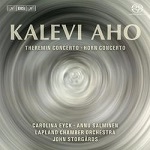

Even the comparatively unadventurous may well enjoy the unlikely combination
of the Theremin – familiar from spooky film music – and orchestra.
Please see reviews
by Dominy Clements and myself on the main MusicWeb International pages
and review
by Dan Morgan. Download from eclassical.com
(mp3, 16- and 24-bit lossless).
You may also wish to try Aho’s Symphony No.11 and Symphonic
Dances (BIS-CD-1336) – from eclassical.com
(mp3, 16- and 24-bit lossless with pdf booklet). In fact, that’s the
best place to begin exploring Aho’s music – review.
Sally BEAMISH (b.1956)
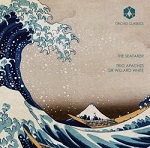 There
are three works by Sally Beamish with the title The Seafarer,
based on the Old English poem of that name. Christopher Thomas praised
the BIS recording of her Viola Concerto No.2 with that sub-title – review.
That’s on BIS-CD-1241, performed by Tabea Zimmerman (viola),
Swedish Chamber Orchestra and Ola Rudner, with Whitescape and
Sangsters and available for download from eclassical.com
in mp3, 16- and 24-bit lossless, with pdf booklet.
There
are three works by Sally Beamish with the title The Seafarer,
based on the Old English poem of that name. Christopher Thomas praised
the BIS recording of her Viola Concerto No.2 with that sub-title – review.
That’s on BIS-CD-1241, performed by Tabea Zimmerman (viola),
Swedish Chamber Orchestra and Ola Rudner, with Whitescape and
Sangsters and available for download from eclassical.com
in mp3, 16- and 24-bit lossless, with pdf booklet.
Now Orchid Classics have recorded the Seafarer Trio –
Sir Willard White (narrator) and Trio Apaches (Matthew Trusler (violin),
Thomas Carroll (cello), Ashley Wass (piano)): ORC100043, with
DEBUSSY La Mer. [52:49]. Download from eclassical.com
(mp3, 16- and 24-bit lossless, with pdf booklet). Of course, you may
well have a recording of the Debussy, but not one performed by a trio
(transcribed by Sally Beamish).
The Seafarer , a poem contained in the Exeter Book of
Old English poetry, is a powerful work describing the ordeals of a man
who has lost his liege lord and is condemned to sail the seas in all
manner of harsh conditions. If I had to choose just one OE poem for
my Desert Island, it would have to be this, the very similarly themed
The Wanderer or The Dream of the Rood, even in preference
to Beowulf. The work has clearly made a great impression on
Ms Beamish, though I’m surprised to see the suggestion on her website
that it was inspired by the Babylonian Epic of Gilgamesh – a
poem lost in antiquity until discovered in cuneiform in the 20th
century and vanishingly unlikely to have been known to the anonymous
Old English poet. What The Seafarer has in common with Gilgamesh
– and The Odyssey for that matter – is its archetypal theme,
the human lot, as summed up at the end as Wyrd biþ swiþre,/Meotod
meahtigra þonne ænges monnes gehygd: Fate is greater, the Lord mightier
than anyone can imagine.
It’s a poem almost impossible to translate but the version employed,
by Charles Harrison Wallace is as good as any that I know – it even
manages to convey the alliterative nature of the original. I rather
think that ‘hail scoured my skin’ even outdoes the original hægl
scurum fleag (hail flew in showers) but ‘middle isthmus’ won’t do
for middangeard (middle earth). There’s a strangely effective
version by Ezra Pound – here
– in which he substituted as far as possible the modern equivalent for
every word of the Old English (Bitter breast-cares have I abided),
sometimes retaining the original (hail-scur flew).
Beamish’s music doesn’t make too many concessions to the listener, but
neither does the poem; the harshness of the music actually suits the
words well. Sir Willard White is an ideal narrator for this unusual
work and Les Apaches are clearly committed to the music. If I was ultimately
less enthralled than Roy Westbrook – review
– I shall certainly be returning to it.
I was, to say the least, sceptical about hearing La Mer in an
arrangement for piano trio and you wouldn’t buy the album for it, but
Beamish kept Ravel’s mature Piano Trio in mind and it works very well
as, effectively, a new Debussy discovery.
Bargains of the Month


 On
disc, the 4-CD Lyrita sets British Piano Concertos (SRCD.2345
–review
andreview
with detailed contents listing) and British String Concertos
(SRCD.2346 – review)
are excellent value, even if you have some of the performances on the
separate CDs where they first appeared, though not originally coupled
as on the sets. MusicWeb International offer them each for £16 post
free world-wide – here
and here.
On
disc, the 4-CD Lyrita sets British Piano Concertos (SRCD.2345
–review
andreview
with detailed contents listing) and British String Concertos
(SRCD.2346 – review)
are excellent value, even if you have some of the performances on the
separate CDs where they first appeared, though not originally coupled
as on the sets. MusicWeb International offer them each for £16 post
free world-wide – here
and here.
I need hardly add that the repertoire is adventurous and the performances
first-rate – in many cases these are still the only or the best recordings.
Only Chandos, Hyperion and, latterly, Naxos, have come close to Lyrita’s
dedication to twentieth-century British music.
Beware: some download providers are asking a good deal more than
£16 for mp3, with both classicsonline.com and amazon.co.uk charging
£31.96 each. To be fair, whenever I have remarked on a similar disparity
of prices I have been told that the manufacturers set the cost of the
download. There is one bargain source for downloading these albums,
however, from 7digital.com: the piano concertos here and the string
concertos here, for £8.49 each. At least that was the price when I
purchased – snap them up if they are still at that price in case it’s
a mistake. Qobuz
have the sets in CD-quality sound but again more expensively than the
CDs at £19.99 each.
There’s no booklet from 7digital so you are likely to be left in the
dark as to which concerto is which but subscribers to Naxos Music Library
will find the booklets available for download there. Both albums can
be streamed from Naxos Music Library – I’m pleased to see that they
have recently added Lyrita to their list of labels, as have their sister
site for downloads, classicsonline.com. The 4-CD sets are too expensive
from COL, making no allowance for the fact that these are budget releases,
but their price for the single CDs from which the selections are taken,
in 320kb/s mp3 at £7.99, is competitive with other providers who offer
less than the full bit-rate.
Something’s Gotta Give
Frederick LOWE and Alan J LERNER On the Street Where You Live
[3:21]
Cole PORTER So in Love [2:36]
Night and Day [4:04]
Richard RODGERS and Oscar HAMMERSTEIN II People Will Say We’re
in Love [4:16]
Jerry BOCK and Sheldon HARDWICK When Did I Fall in Love? [4:05]
Lionel BART Reviewing the Situation [6:06]
Jerome KERN and Oscar HAMMERSTEIN II All the Things You Are [3:37]
Richard RODGERS and Oscar HAMMERSTEIN II Soliloquy [8:08]
Johnny MERCER Something’s Gotta Give [7:10]
George FORREST and Robert WRIGHT Stranger in Paradise [4:24]
Richard RODGERS and Oscar HAMMERSTEIN II It Might as Well Be
Spring [4:01]
Hugh MARTIN and Ralph BLANE The Girl Next Door [3:41]
Jule STYNE and Sammy CAHN It’s Magic [2:56]
Richard RODGERS and Oscar HAMMERSTEIN II Oh, What a Beautiful
Mornin’ [2:49]
Jerry BOCK and Sheldon HARDWICK If I Were a Rich Man [5:41]
Richard RODGERS and Oscar HAMMERSTEIN II If I Loved You (Bench
Scene) [4:49]
Simon Keenlyside (baritone)
Scarlett Strallen, soprano
BBC Concert Orchestra/David Charles
rec. 3-5 March 2014. DDD
pdf booklet available
CHANDOS CHAN10838 [75:38] – from theclassicalshop.net
(mp3 16- and 24-bit lossless) or stream from Naxos
Music Library
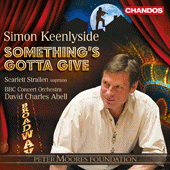 When
it comes to opera singers crossing over into musical theatre or jazz,
I’m generally skeptical. Most of the time, the artist compromises musical
style and vocalism, and the result is something that sounds like the
musical demonstration of fitting a square peg in a round hole. However,
Simon Keenlyside’s recent release, Something’s Gotta Give, proves
that an international opera star can deliver beautiful, natural-sounding
performances of musical theatre classics. Throughout, Simon Keenlyside
manages to maintain the Broadway feel of these songs without compromising
his hallmark lyricism and robust tone.
When
it comes to opera singers crossing over into musical theatre or jazz,
I’m generally skeptical. Most of the time, the artist compromises musical
style and vocalism, and the result is something that sounds like the
musical demonstration of fitting a square peg in a round hole. However,
Simon Keenlyside’s recent release, Something’s Gotta Give, proves
that an international opera star can deliver beautiful, natural-sounding
performances of musical theatre classics. Throughout, Simon Keenlyside
manages to maintain the Broadway feel of these songs without compromising
his hallmark lyricism and robust tone.
The opening selection “On the Street Where You Live” is one of my new
favorite recordings of the song. Keenlyside shapes the sweeping melody
organically and the brilliance in his upper register is a perfect fit
for Freddy. The BBC Concert Orchestra plays ebulliently on this track,
and much credit for this goes to the wind and brass sections.
Keenlyside’s two renditions of Cole Porter classics “So in Love” and
“Night and Day” are also worth specific mention. Porter’s charm comes
through easily thanks to Keenlyside’s clear and natural diction, but
earnest delivery and robust vocalism are what make these tracks exciting.
These songs have been recorded many times, but Keenlyside’s sincerity
gives them a special quality. Oftentimes, singers of Cole Porter can’t
help but deliver the songs with an awareness of the lyric’s wit, but
not Keenlyside. There is no tongue in cheek here, and that allows him
to interpret these songs in a straightforward and refreshing way.
A few of the selections on this collection capitalize on Keenlyside’s
talents with dialects – Reviewing the Situation and If I
Were a Rich Man. In both, he calls upon the skills developed
throughout a career of singing in foreign languages to deliver several
minutes of hilarious, but convincing, dialect singing.
Soprano Scarlett Strallen joins in several duets and also appears in
two outstanding solo selections. Her crystalline tone is a perfect
match for When Did I Fall in Love? She seems particularly comfortable
finding different colors with her voice, and as a result, the alternating
statements and questions in this selection come to life. This track
is also a standout on account the BBC Concert Orchestra’s sensitive
playing and knack for carrying singers all the way through musical high
points. The passage from 2:14 to 2:28 is a great example of musicianship
and collaboration between singer and orchestra. Credit to the harpist
for this magical moment.
The BBC Concert Orchestra, under David Charles Abell, plays superlatively
throughout. Rhythmic vigour (even in slow songs) and super-accurate
timing give a high-definition effect. Their sensitivity and ability
to deliver high-energy with softer dynamics give the singers a lot of
expressive freedom, so there is a heightened sense of ensemble throughout.
It’s not difficult to find excellent recordings by Simon Keenlyside,
so in some respects, it’s not that surprising that Something’s Gotta
Give is such a success. But when I put it next to other operatic
attempts at musical theatre, I realize that it is singular in a lot
of ways. Here is an opera singer who sounds great singing Cole Porter.
Are any Broadway casting directors reading?
Jonathan Rohr
Sing Thee Nowell
New York Polyphony (Geoffrey Williams (counter-tenor); Steven Caldicott
Wilson (tenor); Christopher Dylan Herbert (baritone); Craig Phillips
(bass))
rec. March 2014, Chapel at the American Boychoir School, Princeton,
New Jersey, USA
pdf booklet with texts and English translations included
BIS BIS2099 [71:17] – from eclassical.com
(mp3, 16- and 24-bit lossless)
 Please
see John Quinn’s review
with full track listing.
Please
see John Quinn’s review
with full track listing.
If you find the singing of Ensemble Nobiles on Bis Willekommen
(above) a little too perfect, you will almost certainly agree with John
Quinn that a more robust, less calculated approach would not have come
amiss. This is, nevertheless, a most accomplished and enjoyable album,
with many settings by North American composers which I hadn’t heard
before alongside more familiar works. The now familiar 15th-century
There is no rose, for example, is followed by a setting of the
same words first to S.S. Wesley’s hymn tune Hereford, arranged
by Geoffrey Williams, and by a new (to me) version by John Scott. Later
it features as the first of Sir Richard Rodney Bennett’s Five Carols.
JQ reviewed the SACD and I have been listening to the 24/96 download.
It sounds very well and at present it’s offered at the same very competitive
price as 16-bit and mp3 ($10.66) but when the offer ends you may well
find the SACD for slightly less than the download. By one of those
oddities of economics one dealer who offers both the SACD and downloads
is asking £11.75 for the former and £13.98 for the latter.



 All Nimbus reviews
All Nimbus reviews








